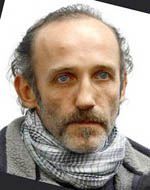The main jury acknowledged the drama Breathing (Austria) to be the best film of the festival. Director Karl Markovics, the former star of the series Rex received the Grand Prix of the festival, the Scythian Deer figurine, diploma and 80,000 hryvnias.
The prize for the best full-length live-action film and 2,500 dollars were awarded to the film Las Acacias directed by Pablo Giorgelli (Argentina-Spain) and the honorable mention diploma was awarded to the film Suicide Room by Jan Komasa (Poland).
The prize for the best short-length live-action film and 2,500 dollars were given to the film The Runaway (by Victor Carrey, Spain) and the honorable mention diploma was given to the film The Girl and the Hunter (by Jadwiga Kowalska, Switzerland). The prize for the best students’ film and 2,500 dollars were shared between the films Coral by Ignacio Chaneton (Argentina) and Twist and Blood by Kuba Czekaj (Poland); the diplomas for the best animation and the best documentary films were given to The Gallery by Robert Proch (Poland) and Midnight by Klara Tasovska (the Czech Republic). Ives Montand Prize to the best young actor/actress and 1,000 euros was awarded to Alicia Vikander who played the leading role in the film Pure (by Lisa Langseth, Sweden).
The jury of the national contest “The Panorama of the Ukrainian Cinema 2010-2011” gave the diploma for the acute author’s position to the film Khvorisukaliudy (by Yurii Rechynsky) and the diploma for the expressive cinematographic language to The Blood by Iryna Pravylo; the first prize of the national contest and 20,000 hryvnias were awarded to the film The Deafness by Myroslav Slaboshpytsky.
The jury of the International Film Clubs Federation (FICC) gave the Don Quixote Prize to the film The Prayer (by Emma Balcazar, Denmark) and the special awards were given to Fellini Factor (by Myroslava Khoroshun, Ukraine) and Coral by Ignacio Chaneton (Argentina). The ecumenical jury awarded the full-length film The Little Room (by Stephanie Chuat and Veronique Reymond, Switzerland) and the short-length film Protect the Nation (by Candice Reisser, South Africa-Germany). The jury of the International Film Media Federation gave the main diploma to the film Breathing and the film Paris-Shanghai directed by Thomas Cailley (France) received the People’s Choice Award. Finally, Molodist awarded the director of the film Offside Natalia Piatyhina and Oleksii Minko who played the main role in the film Rock’n’Ball by Dmytro Prykhodko.
Over two hundred films were shown on the large screen during Molodist-2011. A total of 26 films from 17 countries took part in the students’ films contest, 23 films from
19 countries participated in the short-length films contest, 12 films from
12 countries took part in the full-length films contest and the national contest “Panorama of the Ukrainian Cinema 2010-2011” received 21 films. For the first time since the festival began the students’ and short-length films contests received the films on the digital bearers.
The audience could choose from Ukrainian Premieres, French Connection, German Wave, New Russian Film, Scandinavian Panorama, Polish School of Animation, Polish Documentary Program, Long Nights of Short-Length Films: Germany, Long Nights of Short-Length Films: France, and The Festival of Festivals. Students and beginner directors had an opportunity to visit master-classes of the famed artists of different cinematographic genres.
We should note the special events such as the multimedia performance Portraits; Mania. The Story of a Tobacco Processing Plant Worker that is the special demonstration of a silent movie in which legendary Pola Negri played accompanied by a chamber orchestra and the retrospective show of by the famous French actress Sandrine Bonnaire.
As for the contests, the students’ and professional short-length films did not lack interesting works; however, the importance of any festival competition is measured by the full-length films.
This year the main nomination abounded in chamber, family dramas whose plots developed in various stages of heroes’ misfortune. In A Family of Three (by Pia Strietmann, Germany) a famous writer, wife and mother dies and the father and children have not only to organize decent funerals but also try to get along well. In Volcano (by Runar Runarsson, Iceland-Denmark) an elderly school janitor retires and has problems not only with his disunited family but also with his paralyzed wife. In the film Happy, Happy (by Anne Sewitsky, Norway) the problems in two families result in a range of scandals and betrayals. In The Little Room the young couple is trying to overcome the loss of their baby.
These films also have common weak points. The directors lacked breath to keep the plot and in the second half films flunked and lost their dynamism, actors lost the pivot of the role and resorted to cliches; in general the stories slid into standard melodramas of nearly television format.
Unfortunately, the film Land of Oblivion (by Michale Boganim, France-Germany-Poland-Ukraine)was not a great event either. They had set great hopes on the film since Michale Boganim knows the Ukrai-nian reality very well and her talent had been previously approved by Molodist and the main role was played by famed Olha Kurylenko. Unfortunately, neither the plot, nor the heroes were viable. Everything was filmed well and cameraman’s professionalism is obvious, however, there is a problem with the actors: most of them played in a mediocre way or with excessive anguish, spoke Russian and Ukrainian with an accent; Kurylenko was disappointing in the dramatic role, too. The story itself has a lot of unconformities and the dialogs sound artificially.
In the film Facing Mirrors (by Negar Azarbayjani, Iran) is a typical model of the Iranian social film. It is clear that making a film about two women who defy the prescribed Islamic norms: one of them works as a taxi driver and the other one behaves like a man was a real civil deed for the film director. Taking into account how the independent film directors are treated in Iran we can only wish good luck to Azarbayjani; however, the brave intentions do not necessarily contribute to the artistic quality and the film cannot boast of it.
In the film Pure 20-year-old Katarina, inhabitant of the poor Gothenburg’s suburb, former porn model came across a video of Mozart’s Requiem on the Internet. The girl is fascinated by the classical music. Aspiring to find her “alter ego” she gets a job of receptionist in a concert hall, leaves her boyfriend, her alcoholic mother and old friends and starts dating an older and married conductor Adam. Everything would have been all right but the director could not make a good movie out of the abovementioned events.
Suicide Room is a pretension of a youth subculture film about emo-suicides; however, the result is the sluggish and tearful melodrama with badly drawn computer animation inserts.
Fortunately, closer to the end of the festival decent pretenders to the main awards appeared that was finally proved by the jury.
Bullhead (by Michael R. Roskam, Belgium-Netherlands) is a psychological drama in the form of a criminal thriller. The story about the habits and life of the so-called hormone mafia that has put down roots in the Belgian cattle raising turns to be a sad and even tragic story about a person trying to compensate the mutilation he received when a boy by the excessive, bull strength. In the herd of cattle filled with hormones, just like him, Jacky is the main bull, bullhead equally artificial, but he does not know any other way than this false life: he is finally killed but not by his mutilation but his way of life. This story is really worthy of the tragic heritage.
The film Las Acacias has already won the “Camera d’Or” for the best debut in Cannes and received the prize for the best full-length film at Molodist. The hauler Ruben (German de Silva) gives a lift to the Guarani Indian (Hebe Duarte) with a five-months-old daughter and takes them to Buenos Aires, 500 kilometers through the whole country. The most interesting is what happens between two different people during their journey. De Silva and Duarte make every moment of their heroes’ life sensible and bright. Giorgelli builds up the ideal story and strikes with his skills of holding the rhythm from the first sequence to the last one.
Breathing, the story about the rehabilitation of 19-year-old prisoner Roman Kogler (Thomas Schubert) was deservedly called the best film of the festival.
Karl Markovics became famous as the main character of the detective series Rex. After he left the television rut he unexpectedly fulfilled himself as a successful actor and proved his director’s gift by the film Breathing. Markovics managed to make a good educative novel out of an ordinary story.
Young Roman (Thomas Schubert) cannot stay at any working place for a long time (the employment is a necessary condition of the early release) until he finds the job in a funeral parlor that shocks even the warders.
Everything is at the right place here: Schubert with his reticence and sudden displays of self-destructive aggression and the actors playing secondary roles. Only at the end of the film we find out about the crime Roman committed and the name of his victim. This scene is subdued just like the wholefilm but it is more impressive than any explosive denouement. The hero’s inner transformation is shown by few but exact strokes. The director found special angles, intonation and visual language for every episode. In general, it is a surprisingly mature and skillful work.
Finally, the duel of the social and the intimate that could probably be noticed in the contest finished in favor of art in the works that organically combined those two components. As for Molodist, three skillful full-length films in the main contest is a pretty good result.









